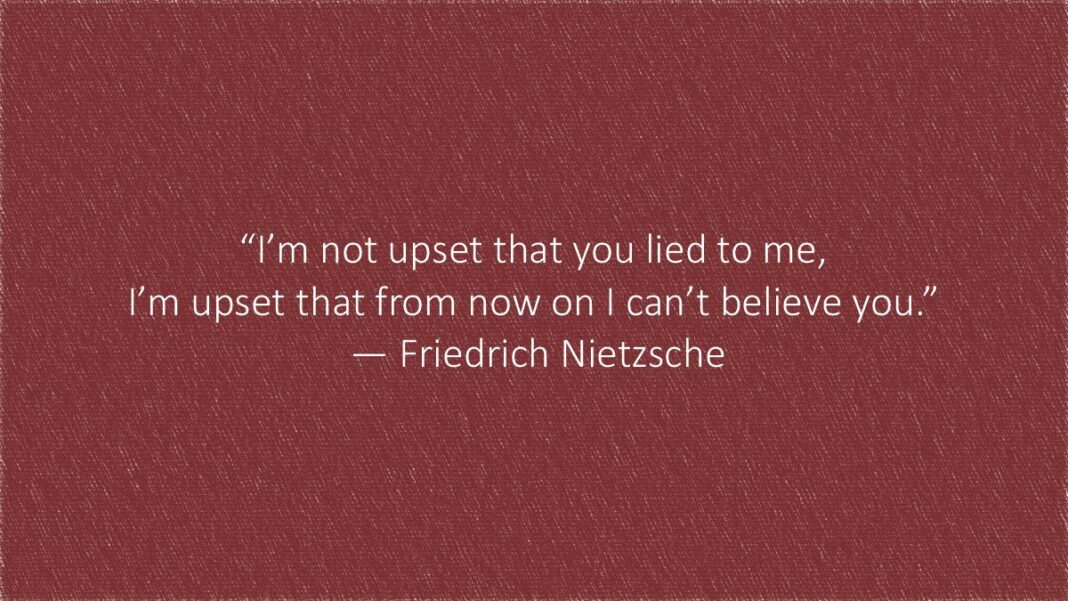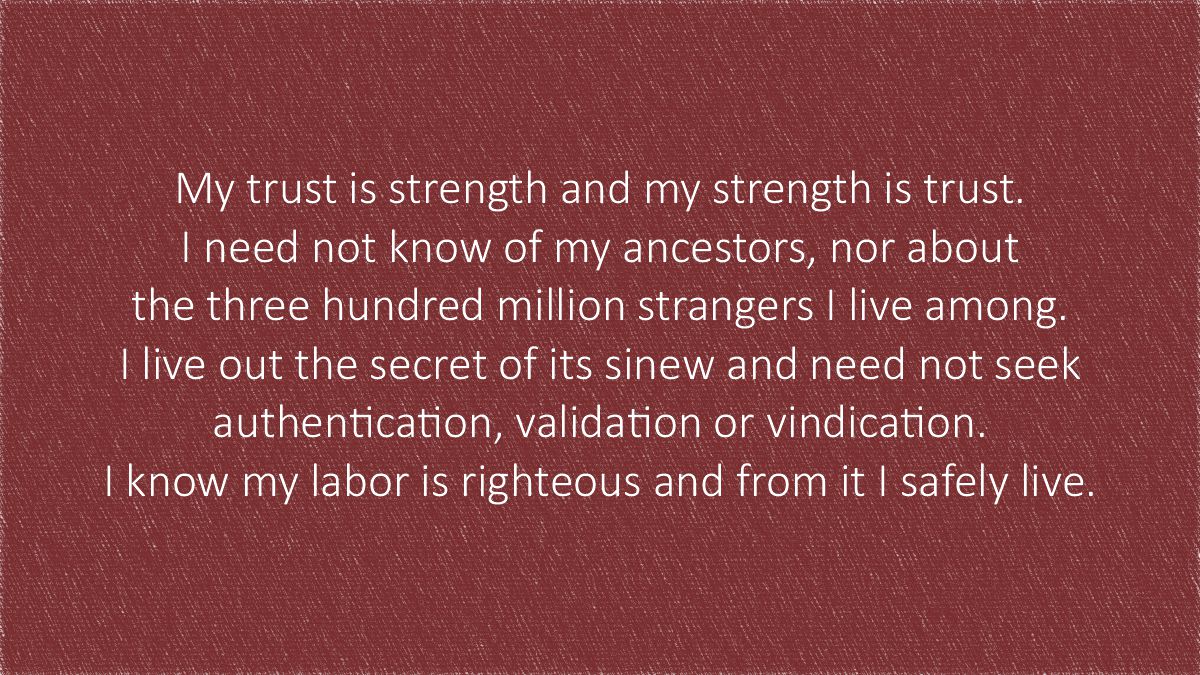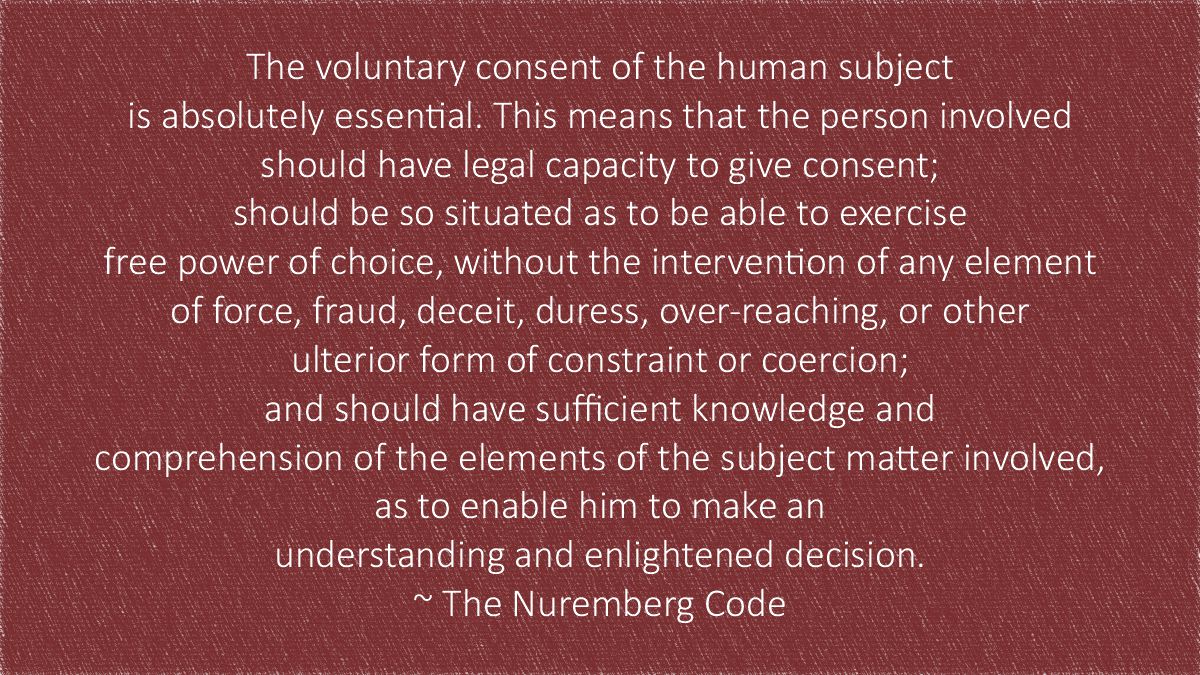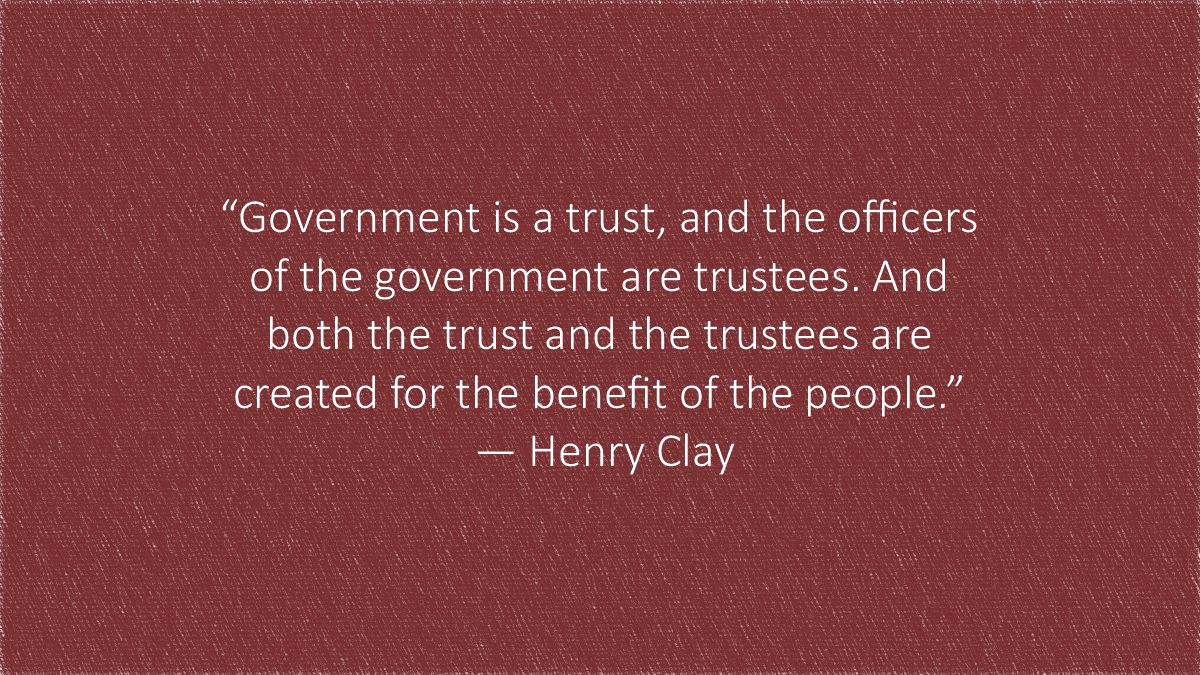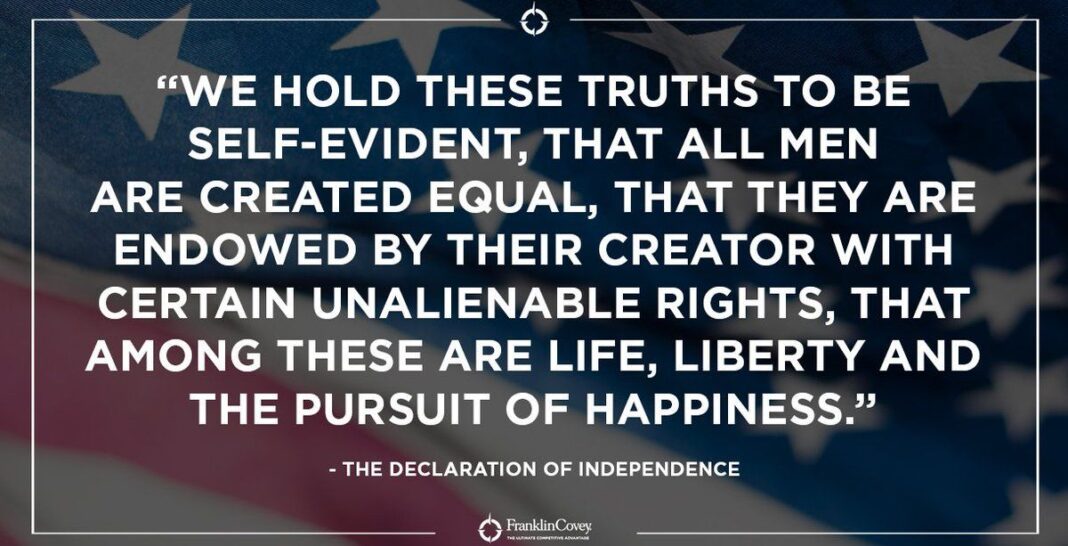The American experiment in governance has always been the most penetrating contract among men. For generations, the world over, it has been revered by populations, by individual men, the tired, the poor, the lonely. In its highest, the entire world ripples while watching the force of American citizens building for themselves according to the laws, to build up their own future families. Nothing is holier, nothing is more exemplary. But what must be for it to continue, for it to endure for its citizens, the sinew of a single principle must remain inviolable among them, by them, towards them, and for them, trust.
Trust has been the constant guarantor throughout the whole history of the experiment, in the root of its founding document, the luminous, debossed lung which pronounced itself to posterity.
Trust has, in the revolutions of the years, with all its scars, all the ungracious toils, all the afflictions, all its periods unwell, all the joys and abundance, stood truly exchanged, through the thin years and the opulent years, the assault upon it withstood, the tempests weathered.
Trust is sacraria. Whoever knows how to speak to it, whoever knows how to listen to it, earns it. There is no need matriculate towards its precepts, it is pertinacious by events and winds, it is the ancient truth of peaceful communal humanity.
The practitioners of Trust know, without knowing why, that a spec buried, a mere bit, a hint of belief in it, is life’s gift granted to it by immortal life. The trial, and the risk, that permanence takes with me is solitary, but by showing it I have divulges the eternal in my smallest display.
My trust is strength and my strength is trust. I need not know of my ancestors, nor about the three hundred million strangers I live among. I live out the secret of its sinew and need not seek authentication, validation or vindication. I know my labor is righteous and from it I safely live.
Trust travels, but not as a suitcase. Trust does not guarantee, but it is not guaranteed. It is never in the possession of the trusted. It is held in escrow by the trusting.
“I’m not upset that you lied to me, I’m upset that from now on I can’t believe you.” ― Friedrich Nietzsche
For governments and institutions, just as it is for individual people, betrayal of Trust comes not uninvited alone, but at the behest of Trust, and by the trusting. People betrayed are stolen from twice, twice injured.
Cataloging the number of institutions in American which have destroyed trust would require the writing of an epic book, a collection of books. For the purpose of this exercise, I’ll address just three categories of institution: Academia, Medical and Media.
Government holds a special seat in destroying trust in itself. The notions of checks and balances, of oversight, of term limits of warrants signed by judges, on top of lying to start wars, of self-enrichment, of the collapse in the confidence of fair elections all suggest the inherent distrust elected officials bring upon themselves since time immemorial, and the weight required of listing examples and/or remedies here, excludes listing below. Suffice it to say trust went out the window before nation states existed.
ACADEMIA
To posit as attestation for example for how higher education in America has destroyed two hundred plus year of trust, I could lazily point to Harvard University which, despite a $40 billion endowment took $9 million in Coronavirus relief. I could have stayed there to point out how they, despite mission statements championing the virtue of debate, while simultaneously dismissing among the world’s most renowned professor, Martin Kolldorff, PHD, Professor Medicine, Harvard Medical School, Professor Medicine, Brigham and Women’s Hospital for the crime of ascending to the virtues of debate surrounding all matters Coronavirus, destroys faith in the good will of Harvard’s hierarchy. We watched as Harvard told us they were committed to inclusiveness, of raising the poorest Americans while professors grow rich by selling secrets to the Communist Chinese secrets, practice discrimination against Asian Americans and white Americans. These are blatant assaults on public trust to be sure, but where trust has been wholly lost nationwide is, in a marrow deep, fundamental denegation of its own commitment to knowledge and its betrayal of a long, full throated promises to provide an open field for anyone willing, ANYONE, willing, to earnestly pursue it.
Take for instance the mission statement of another Ivy, Dartmouth University. We could have reached into the website of any American Institution of higher learning, but it would be a massive process of repetition.
What is a mission statement?
Any institution—whether it is a government organization, corporation nonprofit or college marshal’s it’s members to procure an exact set of goals. When decreed indubitably into words, these goals become a mission statement. It’s laid out firmly as communication of purpose. Mission statements also express the motivation behind this purpose. The principles that motivate and guide an organization’s behaviors. It’s WHO WE ARE and WHY WE ARE.
“…indubitably into words”. This is the qualifying wall of trust. Who I am? This is my word. This is who I am. Any deviation from it, diminishes trust in it. The larger the breach, the more erosion of it, until its finally realized not to be “who you are”, but who you really are, and at that moment trust is gone. And gone forever.
Dartmouth’s Mission Statement
Dartmouth College educates the most promising students and prepares them for a lifetime of learning and of responsible leadership, through a faculty dedicated to teaching and the creation of knowledge.
OUR CORE VALUES
- Dartmouth expects academic excellence and encourages independence of thought within a culture of collaboration.
- Dartmouth faculty are passionate about teaching our students and are at the forefront of their scholarly or creative work.
- Dartmouth embraces diversity with the knowledge that it significantly enhances the quality of a Dartmouth education.
- Dartmouth recruits and admits outstanding students from all backgrounds, regardless of their financial means.
- Dartmouth fosters lasting bonds among faculty, staff, and students, which encourage a culture of integrity, self-reliance, and collegiality and instill a sense of responsibility for each other and for the broader world.
- Dartmouth supports the vigorous and open debate of ideas within a community marked by mutual respect.
Let’s take Dartmouth’s core values. “Dartmouth supports the vigorous and open debate of ideas within a community marked by mutual respect.”
“…encourages independence of thought”.
Sounds very noble. Yet, only days ago, a pattern commonplace at colleges and universities across the nation, whereby speakers invited and disinvited, thus cancelling debate so to eradicate dissent.
Dartmouth canceled a planned in-person appearance by conservative journalist Andy Ngo. Dartmouth’s explanation? “Dartmouth prizes and defends the right of free speech and the freedom of the individual to make their own disclosures, while at the same time recognizing that such freedom exists in the context of the law and in responsibility for one’s own actions. The exercise of these rights must not deny the same rights to any other individual.” In the end, Dartmouth most concretely does not encourage independence of thought. Indeed, it seeks a thing most distinctly otherwise. When your word is worthless,
Trust is gone.
MEDIA
America’s Media is a case made without opponent, an invention without test, a convolution without competing opinion, an attack upon the defenseless. Modern media takes sides. More specifically one side. It vilifies rather than verifies, it celebrates those who make spectacles of themselves rather than arguments for themselves. It has spent the capital of trust trying to portray good people as bad and bad people as virtuous. It has accepted Pulitzer Prizes for hoaxes without remorse apology or shame. These people walk by a b riot, step over beaten innocents in the street, walk by charities deplatformed, and they think, ‘Serves them right’ for disagreeing about matters completely unrelated to the aim of the charity’s mission. But if they apperceive a disparagement against the cabal, it is a different story. Their feet stomp, their calls to cancel appear to be primal scream rather than measure thought. They insult. The degree of their umbrage turned lividness is downright preternatural. Their staunchness is embarrassing as it is sinister.
It is so ingrained in modern American media that it is impossible to get rid of their oppugnant bias. Wherever there is an opportunity of conceiving of things as different from what they are, the principle of manners and good form, a chance to choose a disposition which will make them, their industry, and society as a hole, better, they exercise their power to make things worse. If they should ask a passerby if he does not think one school curriculum more beneficial than another, if one foreign policy is safer than another, if men are men and women are women? The acceptableness of the answer is not subject to debate, to logical reasonings or an invitation to a conversation, but rather how it comports to a strict set of rigid rules and fixed principles. To them, the great dramas of human life are entirely a matter of conformity. No one will assert that the president’s emerging history is one thing or another, that current immigration is dangerous or benign: but if the expression in face is not nodding approval, their thought isn’t persuasion, its punishment, the consequence that the feeling so expressed in stoicism of a Catholic high school boy must be met by derision, despite himself being put upon by a grown man with a drumbeat.
There are several things, the idea of which is a stout gain to the human soul, genius, accomplishment, freedom, purpose, which to modern media, despite their sloganeering to the contrary, have become the distinction of the despised. Qualities better for a society than anything else that could be substituted for them, and which mummify even the most noxious accusations against them. And yet…and yet, media treats them as if there is no difference between the purposes of good governance, which is being abused and ignored daily by TV stations, of the rights individual man, being trampled in Canada and minimized by the print press as I type this, and of mankind itself, being editorialized out of the photograph and animals to be herded. They say of themselves that they are “the most trusted news…”. Hardly.
Trust is gone.
Medical:
It took two generations for Academia to destroy trust in itself. It took media two presidential cycles to accomplish the same. It has taken two weeks to flatten trust in the medical profession.
By far the most disappointing of the institutions which have destroyed trust is the medical profession.
The Hippocratic oath says.
I swear to fulfill, to the best of my ability and judgment, this covenant:
I will respect the hard-won scientific gains of those physicians in whose steps I walk, and gladly share such knowledge as is mine with those who are to follow.
I will apply, for the benefit of the sick, all measures [that] are required, avoiding those twin traps of over-treatment and therapeutic nihilism.
I will remember that there is art to medicine as well as science, and that warmth, sympathy, and understanding may outweigh the surgeon’s knife or the chemist’s drug.
I will not be ashamed to say “I know not”, nor will I fail to call in my colleagues when the skills of another are needed for a patient’s recovery.
I will respect the privacy of my patients, for their problems are not disclosed to me that the world may know. Most especially must I tread with care in matters of life and death. If it is given me to save a life, all thanks. But it may also be within my power to take a life; this awesome responsibility must be faced with great humbleness and awareness of my own frailty. Above all, I must not play at God.
I will remember that I do not treat a fever chart, a cancerous growth, but a sick human being, whose illness may affect the person’s family and economic stability. My responsibility includes these related problems, if I am to care adequately for the sick.
I will prevent disease whenever I can, for prevention is preferable to cure.
I will remember that I remain a member of society, with special obligations to all my fellow human beings, those sound of mind and body as well as the infirm.
If I do not violate this oath, may I enjoy life and art, respected while I live and remembered with affection thereafter. May I always act so as to preserve the finest traditions of my calling and may I long experience the joy of healing those who seek my help.
The Nuremberg Code says:
The voluntary consent of the human subject is absolutely essential. This means that the person involved should have legal capacity to give consent; should be so situated as to be able to exercise free power of choice, without the intervention of any element of force, fraud, deceit, duress, over-reaching, or other ulterior form of constraint or coercion; and should have sufficient knowledge and comprehension of the elements of the subject matter involved, as to enable him to make an understanding and enlightened decision. This latter element requires that, before the acceptance of an affirmative decision by the experimental subject, there should be made known to him the nature, duration, and purpose of the experiment; the method and means by which it is to be conducted; all inconveniences and hazards reasonably to be expected; and the effects upon his health or person, which may possibly come from his participation in the experiment. The duty and responsibility for ascertaining the quality of the consent rests upon each individual who initiates, directs or engages in the experiment. It is a personal duty and responsibility which may not be delegated to another with impunity.
2. The experiment should be such as to yield fruitful results for the good of society, unprocurable by other methods or means of study, and not random and unnecessary in nature.
3. The experiment should be so designed and based on the results of animal experimentation and a knowledge of the natural history of the disease or other problem under study, that the anticipated results will justify the performance of the experiment.
4. The experiment should be so conducted as to avoid all unnecessary physical and mental suffering and injury. 5.
No experiment should be conducted, where there is an a priori reason to believe that death or disabling injury will occur; except, perhaps, in those experiments where the experimental physicians also serve as subjects.
6. The degree of risk to be taken should never exceed that determined by the humanitarian importance of the problem to be solved by the experiment.
7. Proper preparations should be made and adequate facilities provided to protect the experimental subject against even remote possibilities of injury, disability, or death.
8. The experiment should be conducted only by scientifically qualified persons. The highest degree of skill and care should be required through all stages of the experiment of those who conduct or engage in the experiment.
9. During the course of the experiment, the human subject should be at liberty to bring the experiment to an end, if he has reached the physical or mental state, where continuation of the experiment seemed to him to be impossible.
10. During the course of the experiment, the scientist in charge must be prepared to terminate the experiment at any stage, if he has probable cause to believe, in the exercise of the good faith, superior skill and careful judgement required of him, that a continuation of the experiment is likely to result in injury, disability, or death to the experimental subject. the doctor patient relationship, privacy.
Given the wholesale, willful disregard for the Hippocratic Oath and wanton disavowal of the Nuremberg Code. the medical profession has hoisted upon itself and its members, can you imagine sitting on a gurney before a man or woman who swore by that oath, who swore to live by that Code being trustworthy enough to lay the future of your life in his or her hands. After all what is an oath but words to God? Who could hold your trust who would be so bold to refuse it to God?
Can trust be restored? If so, how?
Trust is always on trial. It does not have an ending. Trust must be won and then re-won again everyday— by example. The people always ultimately find out whether they have been hoodwinked, whether they are being led by the honorable. Some thoughts about how one can ensure the people’s verdict lands on the winning side of that truth.
Capturing trust is a free creative activity that rests on a foundation of self-deprecation, not aggrandizement: here we go.
- The hallmark of trust is to comprehend the purpose of the one’s objective, it’s ingredients and impetus.
- Trust is sacrifice more than acquisition. The trustworthy leader always establishes the ethical environment first, the processes second.
- Trust is a philosophy, the ability to understand what is ultimately considerate.
- Posturing or pandering is wholesale forfeiture of trust.
- Trustworthy are men and women of true heart.
- Trustworthy never acquiesce by inaction to incremental outside pressures however insistent these pressures
- Trustworthy and listening are mutually essential
- Trustworthy people protect their reputations as is they were holding water in the hands. They know if they open their fingers for a second the water can never be fully recovered. Any breach of character is an entire breach of trust.
- Lastly, trust must be based on goodwill. It means obvious, even obnoxious unstinting commitment to it. This simple formula is the mystic art that accomplishes that which the wanting science of manipulation could never overcome
I’m always sure to discern the appearance of change from change. The same espoused by more people doesn’t ensure better results. Results, results, results, always get better results. That’s the primary obligation of capturing and keeping Trust. Same goal everyday—By the best words and the finest actions.

